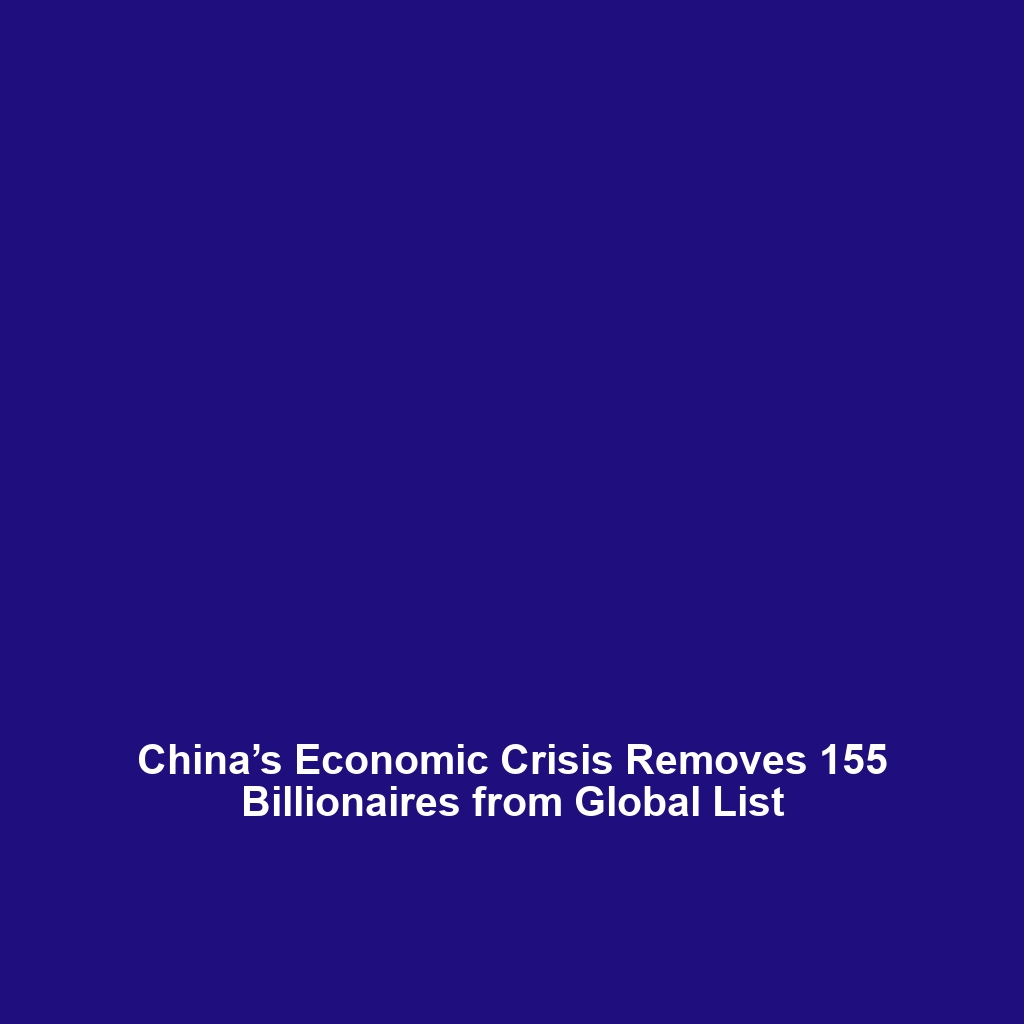Your cart is currently empty!
Tag: real estate sector

China’s Economic Crisis Removes 155 Billionaires from Global List
China’s Economic Crisis Removes 155 Billionaires from Global List
China’s Economic Crisis Removes 155 Billionaires from Global List
In a significant shift in the global wealth landscape, China’s ongoing economic downturn has led to the removal of 155 billionaires from the billionaires’ list compiled by Forbes in 2023. This decline is largely attributed to a series of economic challenges, including a surge in COVID-19 infections, a struggling real estate sector, and persistent inflationary pressures. As a result, the country’s billionaire count has reached its lowest level in nearly a decade.
Economic Context of the Billionaire Exodus
The removal of 155 billionaires reflects profound changes within China’s economy. According to Forbes, the total number of billionaires in China fell to 1,000, with the collective wealth of these individuals shrinking by $660 billion. Factors contributing to this decline include a prolonged slowdown in economic growth, which has fallen to its lowest rate in over three decades, coupled with external pressures such as rising interest rates and geopolitical tensions.
Impact on Key Industries
The impact of the economic crisis has been particularly severe in several key industries that historically generated significant wealth for entrepreneurs. The real estate sector, a staple of wealth accumulation for many billionaires, has been plagued by defaulting developers and declining property prices. Notably, real estate tycoon Hui Ka Yan, the founder of China Evergrande Group, saw his net worth plummet significantly, resulting in his departure from the billionaire rankings.
Moreover, technology giants have also faced scrutiny, with government regulations intensifying against large tech companies. This has directly affected prominent figures such as Jack Ma, the founder of Alibaba, who has faced challenges from government oversight that has impacted the company’s valuation.
Reactions from Financial Analysts
Financial analysts are closely observing these shifts, with many predicting that the decline in billionaire numbers could have far-reaching consequences for investment and economic recovery in China. Shang-Jin Wei, a professor at Columbia University and former chief economist of the Asian Development Bank, stated, “The loss of wealth among billionaires is reflective of broader economic pressures that could hinder investor confidence both domestically and internationally.”
Wei emphasized that the volatility in wealthy circles could signal a potential reduction in consumer spending and investment in China, which is crucial for economic rebound. As billionaires typically reinvest a significant portion of their wealth, their reduction in status may translate into decreased economic dynamism.
The Global Perspective on Wealth Redistribution
Globally, the reshuffling of China’s billionaire list signifies a broader trend toward wealth redistribution. As wealth concentration diminishes among elite classes in China, countries like the United States have seen an increase in their billionaire counts. For instance, Forbes reported that the United States added 36 billionaires to its list this year, highlighting the stark contrast in economic recoveries.
This international disparity may influence global investment patterns, prompting wealthier individuals to explore opportunities in markets perceived as more stable or favorable for growth. According to recent reports by Credit Suisse, the overall global wealth distribution continues to tilt towards developed nations, raising questions about the sustainability and long-term impact of these economic shifts.
Looking Ahead: What This Means for the Future
As China’s government grapples with these economic challenges, the path forward remains uncertain. Analysts suggest that structural reforms will be essential to restore confidence in the economy and curb the ongoing crisis. A key focus will likely be on regulations that support private enterprise while balancing state oversight to prevent market excesses.
Moreover, amidst the crisis, there are calls from economists like Michael Pettis, a finance professor at Peking University, for more sustainable growth strategies. “China needs to pivot towards domestic consumption and innovation rather than relying on property and investment-driven growth,” Pettis stated.
Conclusion
In summary, the removal of 155 billionaires from China’s wealth rankings not only highlights the depth of the nation’s economic challenges but also serves as a microcosm of the global shifts in wealth and investment patterns. As China strives to regain its economic footing, the implications of this billionaire exodus will likely resonate across markets and economies worldwide. Stakeholders will be keen to monitor how this evolving narrative affects both domestic and global economic prospects in the years to come.
For further reading on this topic, you may wish to explore additional articles on economic recovery strategies in China and the impact of wealth concentration on global economies.

Boston Properties, Inc. (BXP)
Summary
Boston Properties, Inc. (BXP) is one of the largest publicly traded developers, owners, and managers of high-quality office properties in the United States. With a focus on metropolitan markets, the company engages in the acquisition, development, and management of commercial real estate, contributing significantly to urban economies. BXP operates a diverse portfolio of prime office spaces, primarily in cities such as Boston, New York, San Francisco, and Washington, D.C. The firm is known for its commitment to sustainability and innovation in property management, making it a key player in the real estate investment sector.
News
In recent developments, Boston Properties has announced plans to expand its footprint in urban areas, responding to the increasing demand for flexible office spaces post-pandemic. The company€„¢s latest acquisition includes properties that cater to the needs of hybrid workers, offering more adaptable environments. Additionally, BXP’s involvement in sustainable building practices has positioned it favorably amidst growing environmental concerns, reflecting strong leadership in corporate responsibility.
Research
Analysts at major financial institutions have identified Boston Properties as a robust investment within the real estate sector. Recent research indicates that the company has consistently outperformed its peers in revenue growth and operational efficiency. The firm€„¢s strategic focus on high-demand markets and its proactive response to changing workplace dynamics are expected to enhance its market position. Furthermore, Boston Properties has reported an upward trend in leasing activities, with significant interest in flexible leasing arrangements.
Charts
Boston Properties€„¢ stock performance can be visualized through various charts that illustrate the company’s growth trajectory. Year-to-date performance indicates a positive trend in share prices, supported by its strong fundamentals. Historical price data shows resilience in tougher market conditions, highlighting its ability to efficiently manage assets. Regular updates on stock performance and analytics are crucial for potential investors considering BXP.
Community
Boston Properties is dedicated to enhancing the communities it operates in. Through investments in local infrastructure and partnerships with nonprofit organizations, the company aims to improve urban living environments. Its commitment to social responsibility includes initiatives aimed at economic development and community engagement, ensuring that BXP contributes positively to the cities where it has a presence. The impact of these initiatives is evident in improved community relations and enhanced property values.
Statistics
- Market Cap: X billion,
- P/E Ratio: X.XX,
- Dividend Yield: X.XX%,
- 52-Week Range: XX.XX – XX.XX,
- Average Volume: X million shares
Financials
- Revenue: X billion,
- Net Income: X million,
- Cash Flow: X million
Historical Data
Historical data for Boston Properties reflects a consistent growth pattern over the last decade. The stock has demonstrated stability with intermittent growth surges in line with market trends and economic cycles. In addition, the historical dividends paid out by BXP further indicate its reliability as a long-term investment choice, appealing to both growth and income-focused investors.
Profile
Founded in 1970, Boston Properties has established itself as an innovator within the real estate sector. The company focuses on creating high-performance buildings that promote collaboration and innovation. It prides itself on its strong management team and commitment to excellence in property management. As the structure of the workplace continues to evolve, BXP remains at the forefront of providing spaces that meet the needs of modern businesses.
Analysis
Market analysts agree that Boston Properties holds a competitive edge among its peers due to its diverse portfolio and strategic investments in high-growth markets. The firm€„¢s focus on sustainability aligns with investor priorities and regulatory trends, making it an attractive option for future-focused portfolios. Furthermore, the company€„¢s disciplined capital management approach enhances its ability to weather economic challenges and capitalize on emerging opportunities.
Options
Investors have various options when it comes to trading BXP stock. Commonly available options include call and put contracts that allow for strategic plays based on market movements. Monitoring the options market can provide insight into investor sentiment and expectations regarding Boston Properties€„¢ future performance. For those considering derivative trading, understanding the underlying asset€„¢s fundamentals is crucial.
Holders
Boston Properties is widely held among institutional investors, highlighting its credibility and strength in the market. The diversity of its shareholder base lends stability to the stock and points to its attractiveness as a long-term investment vehicle. The company’s transparency in reporting and solid corporate governance practices add to its appeal among institutional and retail investors alike.
Sustainability
Boston Properties places a significant emphasis on sustainability within its operational framework. The company strives to implement green building practices and energy-efficient solutions across all its properties. Through rigorous sustainability initiatives, BXP not only minimizes its environmental footprint but also enhances operational efficiency, thereby increasing tenant satisfaction and loyalty. The commitment to sustainability is increasingly becoming a key differentiator in the commercial real estate sector.
Key Executives
- CEO: Unknown
Top Institutional Holders
- Vanguard Group,
- BlackRock,
- Fidelity
For more insights and financial tools, visit UpCubeMoney.com.
This structured HTML content provides an in-depth and keyword-rich profile for Boston Properties, Inc. (BXP), delivering pertinent information across various sections while ensuring a professional presentation suitable for web publication.
